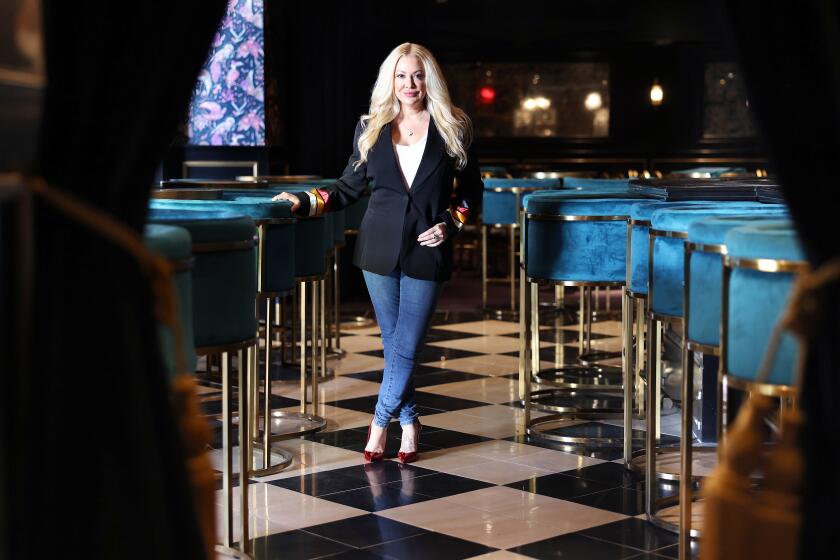Testimony completed in Spector trial
Five months of often-sordid testimony in the murder trial of music legend Phil Spector came to a close Monday, with defense attorneys hoping to convince jurors that actress Lana Clarkson was despondent and even suicidal before she was found shot to death in Spector’s Alhambra mansion.
The theory is at the heart of defense contentions that the 40-year-old actress shot herself on Feb. 3, 2003, only hours after meeting Spector at the House of Blues. Prosecutors contend that Spector, 67, killed Clarkson when she tried to leave his home after a nightcap.
The final day of testimony in Spector’s trial began dramatically when his best-known attorney, Bruce Cutler, abruptly withdrew from the case because of a dispute over who would spearhead the final arguments to the jury.
During a brief appearance before Los Angeles Superior Court Judge Larry Paul Fidler, the high-profile New York lawyer said he had always defended his clients “in a manner that I believed was in their best interests.
“I do not agree with the strategy which will be employed in presenting the defense in this case to the jury on summation,” he said, adding: “I can no longer effectively represent my client under those conditions. Mr. Spector understands this and consents to my application to be relieved in this case.”
Outside court, after Fidler had granted his request, Cutler said that he and Spector had agreed he should leave the defense team after the music producer decided that another one of his lawyers would take the lead in summing up the case to the jury.
“Phil wants to fight this case differently than I want to fight it,” Cutler said.
Loquacious and flamboyant, Cutler has been one of New York City’s best-known criminal-defense lawyers for decades. A former deputy district attorney, he has most famously represented reputed organized crime figures, including the late Gambino family head John Gotti.
At the luncheon recess, Spector said he decided against having Cutler lead the closing arguments because he believed the lawyer’s bruising courtroom style and time away from the case -- to work on a television show -- would hurt his connection with jurors.
“I didn’t think it was in my best interest” to have Cutler handle the summations, the record producer said in his whisper of a voice. “I didn’t think he had the full credibility with the jury” after missing time at trial and a jury visit to Spector’s mansion.
“He was also a target with the judge,” Spector said, apparently alluding to Fidler’s warnings to Cutler about his bare-knuckle courtroom style.
Cutler acknowledged that he and Spector had disagreed about strategies. But he said he was never concerned about his relationship with the judge and was always able to modify his style and technique to fit any courtroom or jury.
“But after the [trial’s] opening . . . there was a feeling on the defense that they wanted to take a different speed and style in approaching the case, and I didn’t agree,” Cutler said.
“I like to take the fight to the adversary.”
Cutler said he felt even more strongly about remaining aggressive after the prosecution opened its case.
“Phil has been so vilified and demonized and dehumanized by the prosecution . . . that it was important to have someone be a champion for his defense. I think I am the best person to do that, but I can’t force my style or strategy on him.”
Legal observers said it did not appear that Cutler’s departure would significantly hurt Spector’s defense, in large part because the lawyer had clashed with others on the defense team and had taken a smaller role in the case since trial began in April.
“The word has been that he wasn’t even participating in brainstorming sessions,” said Loyola Law School law professor Stan Goldman, who has followed the case closely. “So I can’t imagine things being too much different without him.”
But Goldman also said it was possible that Cutler’s “strong personality” could have connected with the jury in the final summation.
“The prosecution has put on this great case with a lot of emotion and five prior women” who claimed to have been threatened by Spector, Goldman said. “And what the defense has put on quite well is scientific evidence.
“The question is: Could Cutler have stolen some of the prosecution’s thunder by also raising emotional issues for the jury? And the second thing you may miss with him gone is how it will be interpreted by the jury.”
With their last bits of evidence presented Monday, defense attorneys and prosecutors sparred over the significance of Clarkson’s statements to friends in the weeks and months before her death.
Jennifer Hayes recalled how nightclub promoter Punkin Laughlin told her that Clarkson had “flipped out” when she went to a party in January 2003 and was allegedly ignored by film director Michael Bay, who had worked with the actress.
The testimony was aimed at refuting Bay’s statement last month that he had not snubbed Clarkson at the party.
Defense attorneys also produced a series of recently recovered e-mails from Clarkson’s home computer. The e-mails, which were projected onto a screen in the courtroom, were almost voyeuristic in exposing Clarkson’s despair over money problems, her personal life and her career.
Time and again, the e-mails show, Clarkson referred to how dire her financial situation had become, worrying about being evicted because she was $200 short on rent or working an entire weekend at a trade show and earning $300 when she needed 10 times that amount to pay her bills.
“This has most definitely been the most difficult year of my entire life,” she said in one e-mail that appeared to have been dated in December 2002.
“Financially, my life is a shambles and I am on the brink of losing everything,” she wrote. “Kind of a strange position to be in at this age.”
Fidler said attorneys will return today to hash out the instructions for the jury, which has been excused until final arguments in the case begin Sept. 5.
More to Read
The biggest entertainment stories
Get our big stories about Hollywood, film, television, music, arts, culture and more right in your inbox as soon as they publish.
You may occasionally receive promotional content from the Los Angeles Times.






